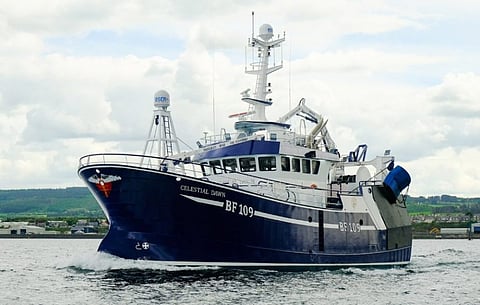AWARDS 2022 | Best Medium Trawler – Celestial Dawn – Macduff Ship Design & Macduff Shipyards
An up-to-the-minute take on a very traditionally styled Scottish trawler, this vessel was designed for a very experienced owner who operates in a very challenging part of the world. The trawler is brutally efficient but manages to combine that with a certain elegance.
"We have been working with our sister shipyard and Wolfson Unit at Southampton University for a number of years to improve fishing vessel hull forms," Macduff Ship Design Managing Director Ian Ellis told Baird Maritime. "This has been driven by three main factors: environmental factors, economic factors, and crew comfort.
"Celestial Dawn has seen all three of these improvements come together in a vessel with reduced hull resistance and improved propulsion, both giving environmental and economic benefits as well as a hull form that improves vessel motions, improving crew comfort and making working aboard easier."
"It is the first vessel in a new series of trawler, specifically designed for targeting prawns and mixed fish," added Macduff Shipyards Manager Matthew Watt. "A lot of research work was carried out at the initial design phase to improve the energy efficiency and the speed of the vessel compared to its predecessors. Computational fluid dynamics was employed to keep the hull resistance as low as practicable.
"The vessel also features a relatively large propeller of 2.5 metres in diameter, an increase of around 30 per cent, which produces more thrust for the same kW compared to similar previous designs."
Ellis said that the vessel's design is the latest stage of several years of collaboration and development. Striking the right balance with these improvements and retaining both ease of operation and layout, which has been refined over decades within the local fishing fleet, was key to ensuring a successful vessel.
For the shipyard, meanwhile, Watt said the project provided an opportunity to learn where improvements can be made in fuel efficiency and seakeeping. The sister ship features a controllable-pitch propeller with hydraulic power and propulsion power arranged from one engine, and it is envisaged that this will further improve fuel efficiency.
"The biggest challenge at this time is improving the environmental impact of all vessels," Ellis added. "Fishing vessels are a particular challenge, as compact vessels often undertake long-duration trips and require high power. We are currently working with several organisations to study potential future fuels and options for fishing vessel design based on these."
Macduff Ship Design is also working on several hybrid electric vessels for the aquaculture industry, with the first of these due for delivery later this year. Although there is a huge drive towards new technology and environmentally friendly solutions, the technology presently available does not provide an easy option for many of these smaller working vessels.
"Still, the fishing industry is developing in many ways with improvements with regards to vessels' environmental impact, crew comfort and safety, and catch quality," said Ellis. "All of these areas are seen to be important areas of development and will continue to push new vessel design."
"At the moment there is an ongoing effort to make vessel as efficient as possible," Watt told Baird Maritime. "We see that alternative fuels are still a little away for the size and type of vessel we generally build, but in the meantime we are concentrating on making the vessels as efficient as possible, which helps lower their carbon footprint. It should also pay dividends when alternative fuels become readily available as we suspect these may be more expensive than diesel. Therefore, the less you use, the more you help keep running costs low."
Watt also believes very large propellers and possibly hybrid/diesel electric power systems will become more popular as options for making vessels more energy-efficient.
Ellis added there is likely to be a significant shift in the propulsion technology used for vessels and with new technologies developing quickly, the optimal solutions will also develop and change.
"The drive for zero emissions technology will make many vessels obsolete and will require a rethink on how new vessels are designed," he told Baird Maritime. "This will potentially have a significant impact on vessel operational patterns."
For a list of the 2022 "Best Of" award winners, please click here.




